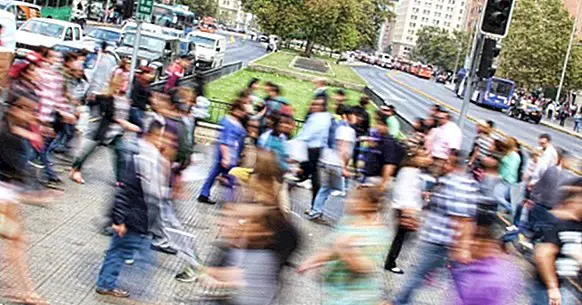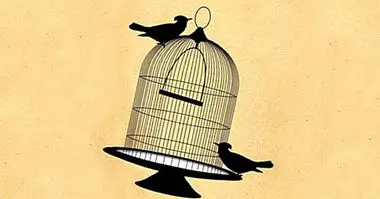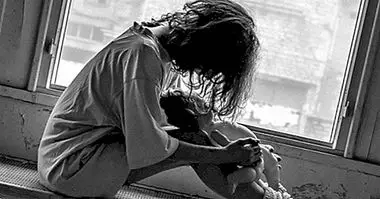The causes of agoraphobia: the fear of fear
Agoraphobia is the fear of situations from which it seems difficult to escape or where it might be difficult to receive help in the event that anxiety symptoms develop.
As a consequence of this anxiety disorder the person avoids the feared situations, endures them with great anxiety or needs to be accompanied when confronted with them.
In this article we will analyze the symptoms and the causes of this "fear of fear" .
- Related article: "Agoraphobia: the fear of losing control"
How is agoraphobia manifested?
Agoraphobia is more frequent in women and in recent years its prevalence has increased. Regarding the age of onset, tends to occur in adolescence, although we can find cases that start at any age.
We can talk about different degrees of agoraphobia: there are people who do not leave home and therefore they avoid totally feared situations, others that support situations with great anxiety but face them on their own and others that only leave home if they are accompanied.
Most usual dreaded situations
Although the fears of each person with agoraphobia may be very different from those of the rest, we will describe below the situations that are most frequently feared or avoided by those with this disorder.
Fear or anxiety is caused not only by feared situations but also by their situations. This fear has to do with the impossibility of escape (either by physical restrictions or by social convention) and the fact of being alone.
1. Closed spaces
Among others, this category would include supermarkets and department stores, cinemas and theaters, classrooms, restaurants, car parks, tunnels, elevators ...
2. Open spaces
They can be interiors, such as stadiums, large rooms and lobbies, or exterior, such as courtyards, wide streets or the countryside.
3. Travel in means of transport
Many people with agoraphobia fear an anxiety attack during a trip by car, bus, train, boat or plane. This is because they imagine that l it would be very difficult to escape from the vehicles if their fears were fulfilled; For example, having a crisis of anguish in the middle of the highway can be a real mess.
- Related article: "Amaxophobia, the irrational fear of driving"
4. Crowds
Parties, meetings, discos, shopping centers, crossing bridges or queuing are some of the situations and places that people with agoraphobia tend to avoid. In these cases the anxiety is caused in large part by the fear of being judged by other people .
5. Being alone
In cases of agoraphobia, the fear of not having trustworthy or close people is frequent. be in a place that provides security , as can be the house itself; this is why being away from home is a rather common agoraphobic fear. However, staying alone at home is another situation that is commonly feared.
Symptoms and "catastrophic consequences"
In general, most people who have agoraphobia suffer or have suffered spontaneous panic attacks, that is, they have occurred without an apparent cause.
People with agoraphobia are afraid of those situations in which they feel that they may suffer anxiety symptoms (panic attacks) as well as their possible catastrophic consequences. However, fear of the consequences of anxiety is irrational because Crises of anguish are not dangerous for those who suffer
The most frequent anxiety symptoms in panic attacks are the following: sensation of choking, palpitations , dizziness, sweating , insecure legs, tightness, pain or discomfort in the chest, abdominal discomfort, depersonalization (feeling separated from oneself) and derealization (feeling of unreality).
Between the catastrophic consequences of the symptoms who mistakenly anticipate the agoraphobes we find: fainting, having a heart attack, dying, screaming, losing control, going crazy, vomiting, drowning, being trapped or helpless and being unable to reach a safe place, not receiving help if you experience symptoms of anxiety...
- Related article: "Panic attacks: causes, symptomatology and treatment"
Causes of agoraphobia
When talking about the causes of agoraphobia it is important to bear in mind that certain personal characteristics may predispose to this disorder or be a consequence of it: dependence, low assertiveness, low self-confidence, social withdrawal, high anxiety, fear of negative evaluation, high search for approval, ineffective strategies to cope with stress, tendency to avoid problems instead of facing them ...
They may also involve experiences during childhood such as overprotection or lack of affection. Likewise, many people with agoraphobia claim that they were going through a time of stress at the start Of the same.
This stress can be related to the labor, to a divorce, to the death of a loved one, to a conflict of couple or family, to an illness or operation, to a move, to a birth or to an abortion, among others.
The origin of "fear of fear"
Regarding the causes of fear, sometimes have traumatic experiences outside the home (such as an accident, theft or fainting), you see others suffering a trauma or showing fear in a certain situation or the person is transmitted threatening information .
You can also incorrectly associate certain symptoms of anxiety or panic to an external situation and thus it becomes feared. For example, symptoms of anxiety can be experienced after a labor conflict and that occur more intensely when traveling by bus a few minutes later, mistakenly attributed to the fact of traveling by bus.
Avoiding the feared situation keeps fear
Anticipating symptoms of anxiety or catastrophic consequences of these causes the person to avoid what he fears and, in turn, those avoidance behaviors maintain anxiety expectations and danger since it is not verified to what extent the threat expectations are realistic or not.
In the long term, avoiding long-term feared situations can cause depression, low self-esteem, greater dependence on others, reduction of social contact, appearance of work and family problems, etc.



















